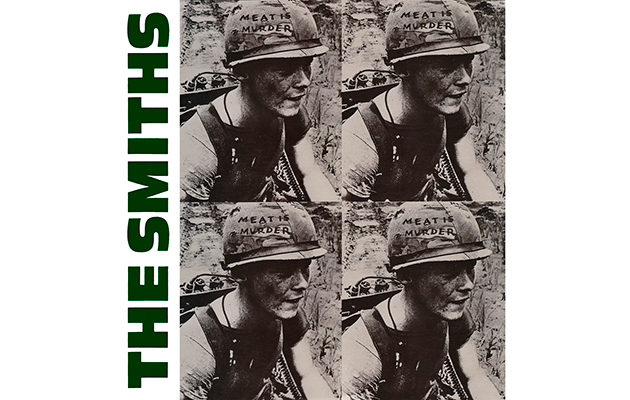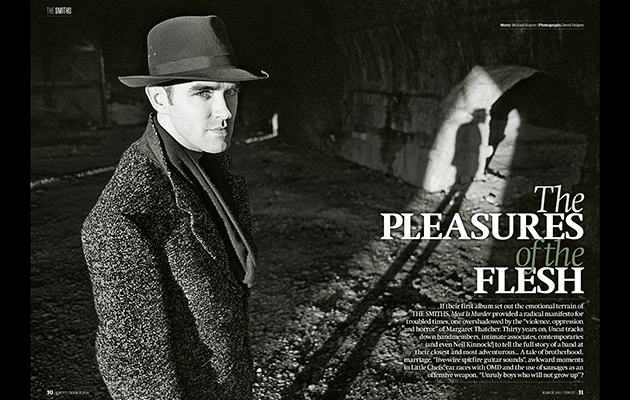With the imminent release of Morrissey’s debut novel, List Of The Lost, now seems like a good time to post my Smiths’ Meat Is Murder cover story from the February 2015 issue of Uncut…
Follow me on Twitter @MichaelBonner
The Pleasures Of The Flesh
If their first album set out the emotional terrain of THE SMITHS, Meat Is Murder provided a radical manifesto for troubled times, one overshadowed by the “violence, oppression and horror” of Margaret Thatcher. Thirty years on, Uncut tracks down bandmembers, intimate associates, contemporaries (and even Neil Kinnock!) to tell the full story of a band at their closest and most adventurous… A tale of brotherhood, marriage, “live-wire spitfire guitar sounds”, awkward moments in Little Chefs, car races with OMD and the use of sausages as an offensive weapon. “Unruly boys who will not grow up”?
The distance travelled by The Smiths in late 1984 can be measured, to some extent, in car journeys. En route with the rest of The Smiths from their respective homes in Manchester to Amazon Studios in Kirkby during the winter of 1984, Morrissey would sit at the back, to best enjoy the full benefit of the car’s central heating system. The vehicle – a 1970s white stretch Mercedes rented from R&O Van Hire, Salford – had once been used for weddings. Now it was being used for another type of celebration. The Smiths – along with their fledgling co-producer, Stephen Street – were heading to Amazon to record their second LP, Meat Is Murder. “We had a feeling the grown-ups had left the building and it was left to us to break some rules and have some fun,” Johnny Marr told Uncut.
Despite the weather, the daily trips shuttling to and from Kirkby were conducted in high spirits, characterised by an air of anticipation for what the coming sessions would bring. The interior of the car featured two rows of seats, facing each other like a cab. Morrissey and Johnny Marr would face forward on the back seats, while Andy Rourke and Mike Joyce sat in front of them, facing the rear of the car. If there were any disagreements between the band members, it was usually to do with the heating – which Morrissey would complain wasn’t turned up high enough. “Amazon was on an industrial estate in the middle of nowhere,” says Andy Rourke. “It was the freezing winter. We’d stop for a cup of tea at this mobile café and carry that into the studio. That was our routine for two or three weeks.”
An industrial estate in Kirkby, on the outskirts of Liverpool, in the depths of winter, hardly seems the most auspicious setting from which to storm the citadel. All the same, the work started here by The Smiths on Meat Is Murder was freewheeling and stimulating. “It was very exciting,” acknowledges Stephen Street. “It felt like all the stars were in alignment, everything seemed to be working.”
While historically Morrissey’s songs had lingered on a nostalgic, post-war vision of England – one of juvenile delinquents, underworld spivs and “jumped-up pantry boy”s – Meat Is Murder presented a different, highly politicised side to the band. The songs on the album addressed powerful, contemporary themes including animal rights, domestic and institutionalised violence.
“The Smiths were out there on their own,” Paul Weller tells Uncut. “I thought they were similar to The Jam, really. It wasn’t a party line thing, and the lyrics weren’t always overly political. But they still seemed to reflect what was going on in people’s lives.”
“The issues they were addressing in the songs on Meat Is Murder were socio-political,” adds Billy Bragg. “My politics were more ideological, but The Smiths were more involved in broader issues; we lived in a time when those issues were right to the forefront of debate.”
“The politics of the day had a big effect on the music and Morrissey’s lyrics,” admits Andy Rourke. “That’s what we wrote songs about: our experiences. That comes across in the music, also.”
If Meat Is Murder helped establish The Smiths as a radical force, it had other, equally far-reaching implications for their career. These were fluid and fast-moving times for the group: since releasing their first single, “Hand In Glove”, in May 1983, their ascent had been rapid and exhilarating, building on a brace of thrilling singles and, in February 1984, a self-titled debut album. Meat Is Murder, though, is best characterised as an exchange of ideas at a higher level. It moved their story forward credibly, giving them their only No 1 album, in the process dislodging Springsteen’s Born In The USA from the top of the UK album charts. It also represented a point where Morrissey and The Smiths were at their tightest. “Morrissey always wanted to be part of a gang,” says Richard Boon, then production manager at Rough Trade Records. “He’d never been, because he was such an outsider character.I remember being in the band’s van once when they were coming down to London. They were all wearing white T-shirts because that would make us stand out and they wanted to stand out. By Meat Is Murder, The Smiths had cohered as a gang.”
“It all happened very quickly,” reflects Rourke. “Especially at that time, things picked up even more, and the records started selling better than they had done. I think it always continued upwards, but around Meat Is Murder, it definitely stepped up a gear. They were crazy, busy times.”




